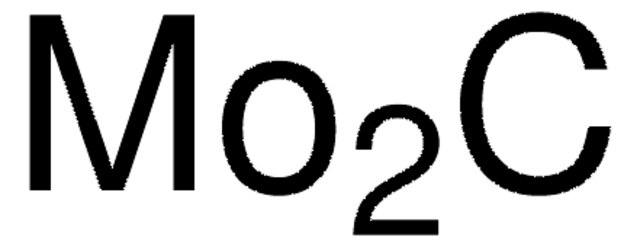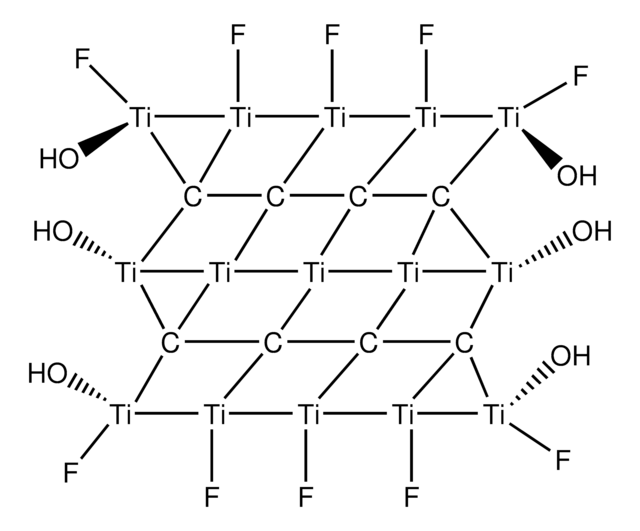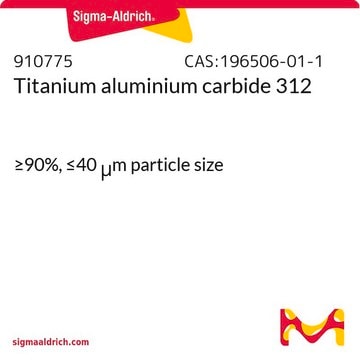307807
Titanium(IV) carbide
−325 mesh, 98%
Iniciar sesiónpara Ver la Fijación de precios por contrato y de la organización
About This Item
Fórmula lineal:
TiC
Número de CAS:
Peso molecular:
59.88
EC Number:
MDL number:
UNSPSC Code:
12352300
PubChem Substance ID:
NACRES:
NA.23
Productos recomendados
Quality Level
assay
98%
form
powder
particle size
−325 mesh
bp
4820 °C (lit.)
mp
3140 °C (lit.)
density
4.930 g/mL at 25 °C (lit.)
SMILES string
[C-]#[Ti+]
InChI
1S/C.Ti/q-1;+1
InChI key
YXIVWSJCLXKLJL-UHFFFAOYSA-N
¿Está buscando productos similares? Visita Guía de comparación de productos
Storage Class
11 - Combustible Solids
wgk_germany
WGK 1
ppe
Eyeshields, Gloves, type N95 (US)
Elija entre una de las versiones más recientes:
¿Ya tiene este producto?
Encuentre la documentación para los productos que ha comprado recientemente en la Biblioteca de documentos.
Los clientes también vieron
T Henning et al.
Spectrochimica acta. Part A, Molecular and biomolecular spectroscopy, 57(4), 815-824 (2001-05-10)
We review the evidence for carbides in space both from infrared spectroscopy and direct measurements on presolar grains extracted from primitive meteorites. The paper includes a discussion of the structural properties of silicon carbide and metal carbides and their formation
Yuhe Zhu et al.
Dental materials journal, 26(2), 245-253 (2007-07-12)
Carbide layer was formed on the surface of Ti by heating in hydrocarbon atmosphere (benzene C6H6) at 1000-1400 degrees C using a high frequency induction heating method. Physical and mechanical properties of carbide-coated Ti were investigated to examine its potential
Lingzhou Zhao et al.
Biomaterials, 31(32), 8341-8349 (2010-07-30)
Cell-repelling structures are often required in biosensors, bioelectronics, and drug delivery systems, but the search for satisfactory cell-repelling structures with good biocompatibility and long-term stability is challenging. In this work, two types of quasi-aligned nanowire arrays (QANWA) with different surface
Jorge L Chávez et al.
Nanotechnology, 21(5), 055703-055703 (2009-12-22)
Hybrid organic-inorganic templates and core-shell nanoparticles were used as models to study the communication between fluorescent probes placed inside nanoparticles. The hybrid templates were prepared on the basis of a mixed-surfactant system using octadecyltrimethoxysilane as a reactive amphiphile. The core-shell
J Rohrer et al.
Journal of physics. Condensed matter : an Institute of Physics journal, 22(1), 015004-015004 (2010-01-13)
We present a strategy to identify energetically favourable oxide structures in thin-film geometries. Thin-film candidate configurations are constructed from a pool of sublattices of stable and metastable oxide bulk phases. Favourable stoichiometric compositions and atomic geometries are identified by comparing
Nuestro equipo de científicos tiene experiencia en todas las áreas de investigación: Ciencias de la vida, Ciencia de los materiales, Síntesis química, Cromatografía, Analítica y muchas otras.
Póngase en contacto con el Servicio técnico









